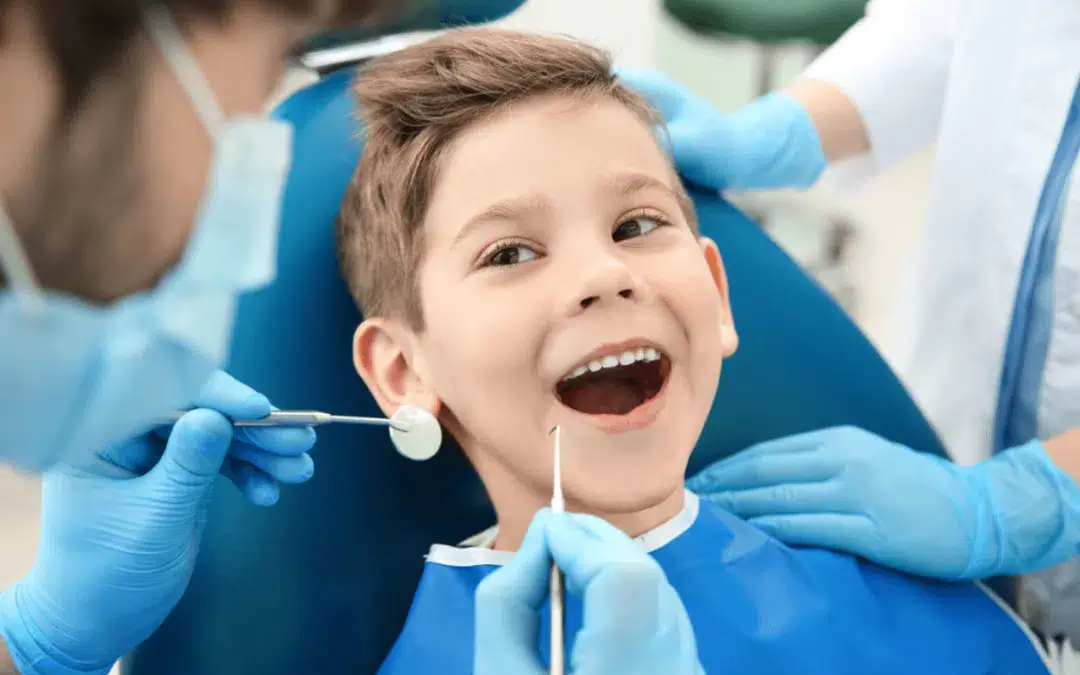Dental anxiety in children is common. The Australian Research Centre for Population and Oral Health state that roughly one in 10 children experience anxiety surrounding dental visits. Dental anxiety in children can result in avoidance of or postponing of dental check-ups and treatments. Unfortunately, doing so may result in some dental issues not being picked up early when less invasive treatments may be an option. It can also result in less reinforcement and help with establishing good oral hygiene habits.
As your Northern Beaches children’s dentist, we have a lot of experience and love caring for children’s dental health. In this article, we share some tips for managing dental anxiety in children.
Common Causes of Dental Anxiety in Children
To be able to help your child with their dental anxiety, it is essential to understand what may cause it. Reasons for dental anxiety vary from one child to another, but below are some of the common causes:
A Previous Bad Experience
Children who have had a bad experience from a painful or stressful medical treatment before may be more likely to want to avoid their next appointment.
Fear of The Unknown
Children are creatures of habit. Routine gives them a sense of security. So, for children who are unfamiliar with going to the dentist, it can be a real reason for them to worry. Not knowing what to expect can create heightened anxiety.
Vicarious Fear
Children can be influenced by the dental anxiety of others, for example, yours, as a parent or that of their school friends. When they hear recounts of bad dental experiences or witness dental anxiety first-hand, it can rub off on them.
Managing Dental Anxiety in Children
Having the tools to manage your child’s dental anxiety is key to ensuring that they develop good dental habits and maintain good oral health through their life. Below are some great tips to help you ease your child’s worries about going to the dentist.
Start Dental Visits Early
A good time for a child to start visiting the dentist is once they have their first teeth come through. Once they have been to the dentist for the first time, try to maintain regular dental visits. Not only does this allow your child to become familiar with the dental environment, but it also lets them develop a good rapport with their dentist.
The earlier your little one starts visiting the dentist, often the more comfortable they are at the dentist. This results in less chance of them suffering from dental anxiety. Regular dental visits give them a great chance of having healthy and happy teeth and gums.
Lead by Example
As a parent, it’s important to be a good role model for your children and lead by example. As mentioned, vicarious fear is as real as ever amongst children. So, it’s vital to be positive when talking about the dentist, dental visits, and your own dental experiences.
Speaking about the importance of good oral health and how the dentist can help them achieve that is a great way to put them at ease. Similarly, following a good oral hygiene routine yourself, that you can show to them, is essential.
Listen Well and Explain Clearly
Sit down with your child before their dental appointment and hear them out. Take the time to listen and understand their concerns surrounding visiting the dentist.
Children like to know what’s going to happen next. They are much more likely to be at ease in the dental chair if they know what to expect. You can help them by explaining to them clearly, what their check-up may include and what they may experience. It can help to describe some of the sensations your child might experience during their dental visit. These can include, for example, noises, sounds and tastes.
Many children’s cartoons have books or episodes dedicated to describing and explaining what to expect from a visit to the dentist. Your kids favourite characters can help give them confidence when they visit the dentist.
Encourage Relaxation Techniques
Practising relaxation techniques is a great way to calm nerves, for adults and children alike! Having your child focus on methods of stress-reduction can help slow their body’s physical reaction to dental-related anxiety.
These relaxation techniques can include, for example, deep breathing exercises and progressive muscle relaxation. Your child can practise these techniques in the car on the way to the dentist, in the waiting room and even in the dentist chair itself.
Positive Reinforcement
Children respond well to positive reinforcement. Small rewards, i.e. stickers or a little outing post dental treatment, can make great incentives to reward good behaviour and cooperation at the dentist.
Northern Beaches Children’s Dentist
One of the best things you can do to manage your child’s dental anxiety is to choose the right dentist for them. The dentist you choose to trust with your family’s oral health can play a major role in their dental experiences and the way they perceive future dental visits.
Are you looking for a Northern Beaches children’s dentist? Beaches Dental Mona Vale is here to help! We have a lot of experience and love helping the littlest of patients with their oral health. Our gentle team of dental professionals do everything possible to make sure each visit is a positive experience for every member of the family, young or old.
We aim to support you in helping your child develop good oral hygiene habits from an early age and set the tone for a lifetime of good oral health.
Contact our friendly team for more information on our children’s dentistry services or to make an appointment at our Mona Vale dental practice.

